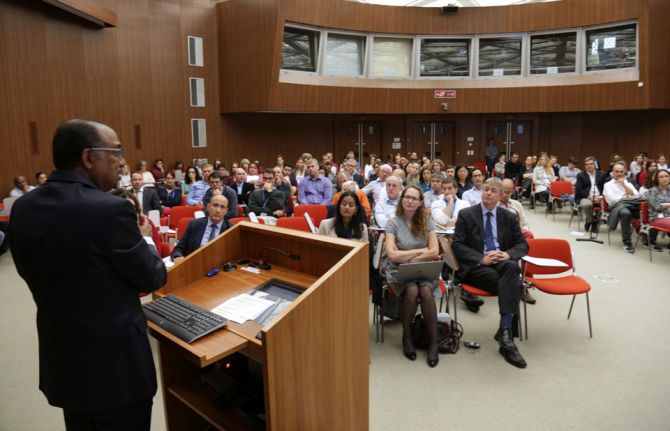

Update
Call to break down silos between HIV and cervical cancer prevention
03 October 2017
03 October 2017 03 October 2017The Executive Director of UNAIDS, Michel Sidibé, has highlighted the urgent need to break down silos and integrate HIV and sexual and reproductive health services, including for the prevention and control of cervical cancer, which is an AIDS-defining illness. Mr Sidibé delivered his message at the International Agency for Research on Cancer in Lyon, France, on 3 October.
Leveraging the experience of more than three decades of the AIDS response, Mr Sidibé called for greater mobilization and the breaking down of silos between programmes, movements and services to deliver comprehensive sexual and reproductive health services for women and girls. He also reiterated the need to engage with civil society.
Women living with HIV have an up to five times greater risk of developing cervical cancer, which is the second most common cancer among women living in low- and middle-income countries. Despite cervical cancer being highly preventable with the human papillomavirus vaccine and generally curable with early diagnosis and treatment, more than 528 000 women are diagnosed with it every year and around 266 000 die needlessly, almost 90% of whom live in low- and-middle-income countries.
During his speech, Mr Sidibé highlighted the immense opportunities provided by the Sustainable Development Goals and the 2016 United Nations Political Declaration on Ending AIDS, as well as the resources made available through the Global Fund to Fight AIDS, Tuberculosis and Malaria, which reflect strong global commitment to scaling up integrated services to address coinfections and comorbidities.
Quotes
“It is an unacceptable tragedy that women are dying from cervical cancer because of where they are born, because they are poor and because they do not have access to the life-saving vaccines, diagnostics and treatment available to girls and women in high-income countries.”
“Chronic infections are associated with around one in six cancers worldwide and more than one in three in sub-Saharan Africa. Working collaboratively in a strategic manner across the HIV and cancer fields offers many potential opportunities to reduce the disease burden in some of the world’s most vulnerable populations.”



